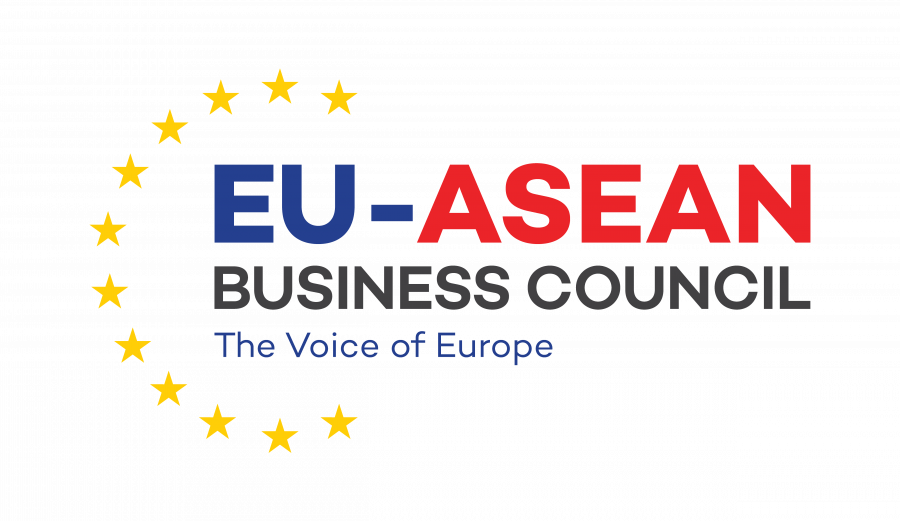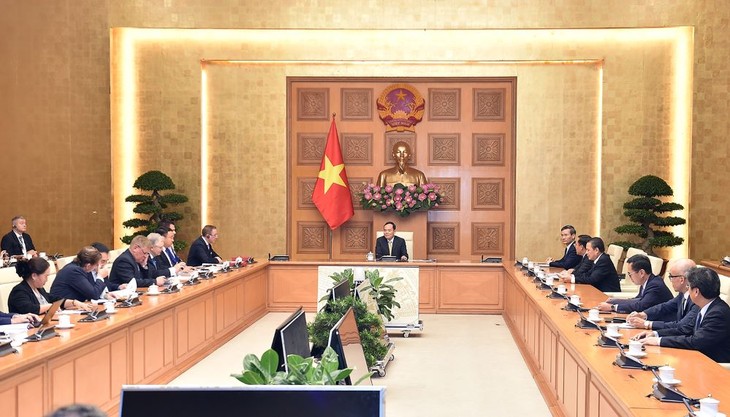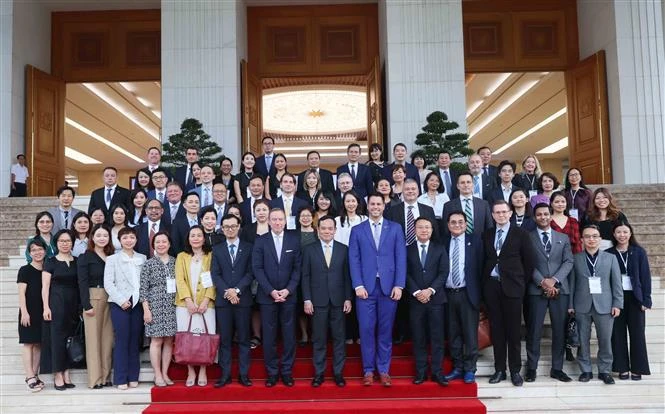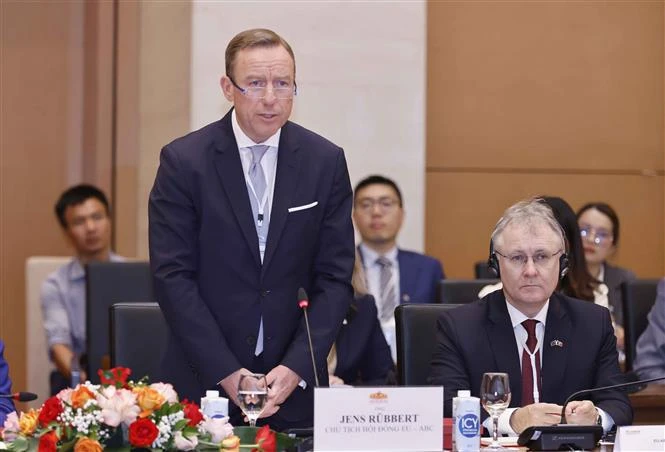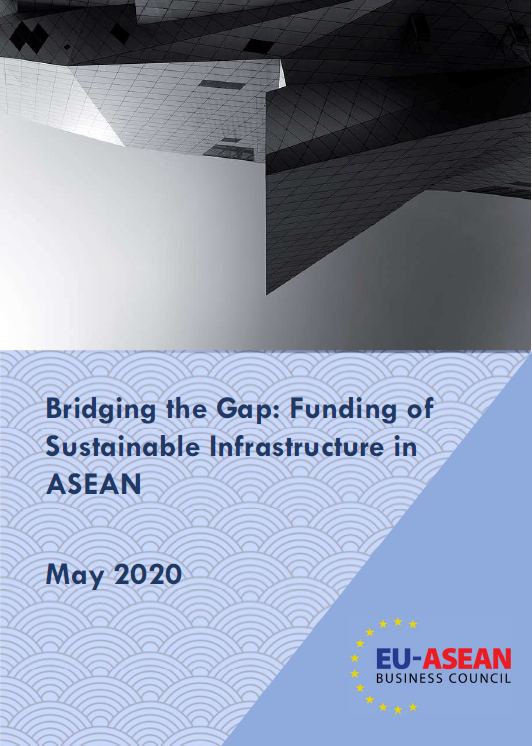
• Recommendations include standardisation of reporting, improving investment conditions and regulations, and creating financial instruments tailored to overcome common financing impediments
• Sustainable infrastructure in sectors such as waste management, digital and public health care is expected to be a key determinant for the region to attract investment and contribute to post-COVID recovery
• Decision makers are advised to take a total cost of ownership approach while ensuring that their decisions contribute to sustainable economic development
The EU-ASEAN Business Council (EU-ABC), sole voice for European business covering all of the ASEAN region, today published a paper aimed at furthering the discussion on how ASEAN’s infrastructure projects can be financed in a sustainable manner.
In support of Vietnam’s Chairmanship Theme of a Cohesive and Responsive ASEAN, the “Bridging the Gap: Funding of Sustainable Infrastructure in ASEAN” paper outlines recommendations on how ASEAN leaders can better support infrastructure development in their respective countries. With public funds usually insufficient to meet infrastructure demands, the key recommendations put forward by the EU-ASEAN Business Council focus on creating a favourable environment that boosts private sector participation and meets UN Sustainable Development Guidelines.
“Investment in sustainable infrastructure will drive a ‘green recovery’ from the pandemic, not only creating jobs but also improving health and mitigating climate change,” said Donald Kanak, Chairman, EU-ABC and Chairman of Eastspring Investments. “Investments in physical and social infrastructure, including education and digital health, will also help close financial and development gaps and position ASEAN for inclusive growth in the post-COVID hyper-competitive digital economy.”
Infrastructure remains an important economic enabler for ASEAN, representing a vehicle to drive future economic and social prosperity amidst rapid urbanisation that is straining existing resources. According to the Asian Development Bank (ADB), ASEAN’s annual average infrastructure spending is estimated to be US$184 billion per annum. A current funding gap of nearly US$100 billion exists today, making it a top priority for ASEAN governments as poor infrastructure impedes economic growth and constrains the quality of life for communities across the region.
Satyanarayan Ramamurthy, Partner and Head of Infrastructure, Government and Healthcare of KPMG said “The new reality emerging from Covid-19 presents a unique opportunity to tackle the challenges presented by climate change and the long term sustainability of the current economic growth model. The infrastructure sector has a pivotal role to play in meeting national, regional and globally relevant Sustainable Development Goals (SDGs). As we see the transition into clean energy becoming the new norm in ASEAN, the importance of securing and deploying green funds and capital to finance and develop sustainable infrastructure remain a priority for the public and private sectors. Digital technologies will enable greater efficiency and effectiveness throughout the asset lifecycle, while at the same time facilitating transparency in the assessment and comparison of environmental, social and governance (ESG) risks”
Tony Cripps, CEO HSBC Singapore said: “As the ASEAN governments start designing stimulus plans to reignite their economies, it’s vital that any slated infrastructure or nation-building projects are consistent with globally agreed climate and sustainable development goals and commitments. Doing so will enable Southeast Asia countries to manage the region’s rapidly changing environment, demographics, and technology needs, whilst attracting a wider pool of international investment.”
Other Recommendations:
1. Capital Market Development
The first recommendation pertains to the standardisation of reporting, documentation, and benchmarking. The level of standardisation makes financial markets investable from an operational perspective. Achieving international standards and harmonising market practices in ASEAN is expected to be a key differentiating factor for market investors interested in the region.
2. Long Term Investment Rules & Regulations
The second recommendation is to improve investment conditions and the offering of non-discriminatory regulatory regimes to encourage greater participation by insurers in long-term investments. The paper highlights the need to increase the role of insurance companies and pension funds in providing long-term investment against the backdrop of varied regulatory treatment which constrains the ability of insurance companies to make long-term investments.
3. Expanding Blended Finance Initiatives
The third and final recommendation is creating a toolbox of financial instruments tailored to address the common impediments found in project financing and simplify access to risk mitigation instruments. The paper notes that a key barrier for financing sustainable infrastructure projects is the lack of opportunities that are defined as investment grade by credit rating agencies and not the lack of projects themselves. Standardising these financial instruments can address common risks associated with sustainable infrastructure projects and meet the investment requirements of different sources of financing, promoting adoption by project sponsors and financiers.
The recommendations in the reports are especially timely given that COVID-19 has introduced a systemic economic shock into the global economy. ASEAN now finds itself in a time of profound and unprecedented economic turbulence. Sustainable infrastructure can be the way forward for the region, helping ASEAN to take advantage of the future economic recovery. In a post-COVID reality, having the right infrastructure in place is expected to help facilitate further investment into the region, driving cross-ASEAN trade and exchange. Sustainable infrastructure in sectors such as waste management, digital and public health care is expected to be a key determinant for the region to attract investment.
The paper notes that as a new global urban system is being set in train, sustainable infrastructure development will be critical to develop more connected trade routes, advanced mobility, and digital connectivity in urban hubs. In order for ASEAN nations to build resiliency in their economies, driving investment into the region will be the key to fulfilling these development goals and growing sustainably.
END.
View the full list of EU-ABC publications here
